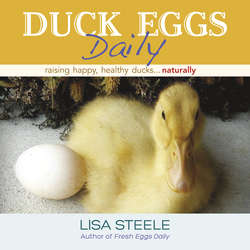Читать книгу Duck Eggs Daily - Lisa Steele - Страница 22
На сайте Литреса книга снята с продажи.
Feed
ОглавлениеFeed should be provided at all times for your ducklings, away from the heat source and fairly close to the water. Ducklings can choke if they eat without drinking, so you want to keep the feeder and waterer next to each other. Traditional Mason jar chick feeders don’t work well for ducklings any better than the Mason jar chick waterers mentioned above, since the little guys have trouble fitting their bills in the small holes – and the Mason jar feeders are also prone to tipping over. Instead, I use a small terracotta planter base or a sturdy casserole dish for feed. Since ducklings go back and forth between their feed and water, the terracotta also helps keep the feed a bit more dry by wicking moisture away. Leftover feed should always be discarded at the end of each day to prevent mold, but wet feed can be left during the day without a problem.
What kind of feed? Regular chick feed is fine for ducklings if you can’t find waterfowl starter feed. However, ducklings should only be fed UN-MEDICATED feed. They eat more feed per ounce of body weight than chicks, so it’s possible for them to over-medicate themselves, and since they aren’t as susceptible to coccidiosis anyway, there is no need to feed them medicated feed.
• For the first 2-3 weeks: Offer chick feed (19-21% protein) all day long, and preferably through the night as well (as mentioned previously, just be sure ample water is also provided).
• From 3-9 weeks: You will notice a substantial growth spurt at about 3 weeks, so switch at that point to the lower protein starter/grower feed (15-17% protein) until they are about 9 weeks old. Too much protein can cause leg and wing deformities, kidney and liver damage.
• From 9-20 weeks: Ducks are close to their adult weight by 9 weeks and grow slowly between 9-20 weeks, so give them grower feed (15% protein) – or continue to feed them the starter/grower feed during this phase.
• Around 20 weeks or so: At this point they will be ready for layer feed (16% protein with added calcium) to prepare them to begin laying. Ducks should start laying any time after 21 weeks old. A good layer will lay for more than four years and live to be eight to ten years old on average, although ducks living a dozen to 15 years is not unheard of.
